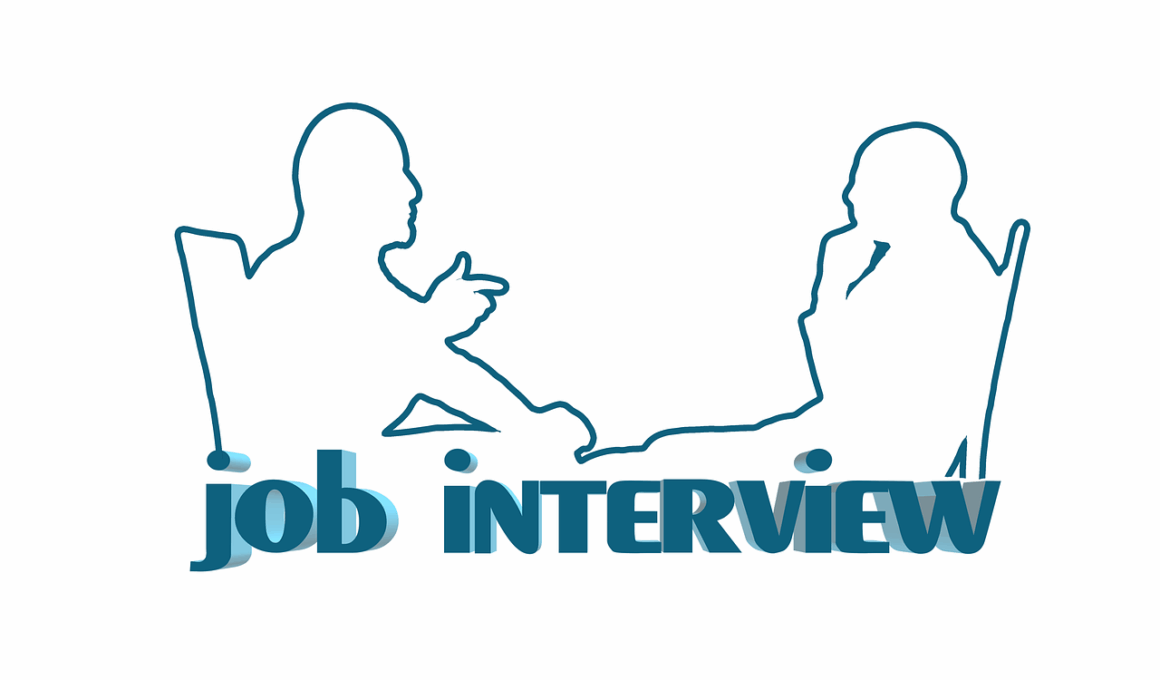Assessing Soft Skills in Finance Candidates: Interview Approaches
When interviewing candidates for finance roles, soft skills are increasingly recognized as critical components of success. These include communication, problem-solving, and teamwork capabilities. To effectively assess these attributes, interviewers should utilize tailored techniques that encourage candidates to demonstrate these skills practically. One such method is behavioral interviewing, where participants provide examples from past experiences that showcase their soft skills. Interviewers should prepare targeted questions that allow candidates to articulate their contributions in various situations. Questions may encompass conflict resolution, facilitating teamwork, or managing tight deadlines. This strategy not only reveals candidates’ abilities but also provides insight into their thought processes. Another tool in this process is role-playing scenarios that mimic real-life challenges in financial settings. Candidates can showcase how they would navigate these challenges while employing their soft skills. Additionally, utilizing assessment centers that incorporate group dynamics can effectively evaluate collaboration and communication. Encouraging discussions among candidates can allow the interviewer to observe team interaction styles. Ultimately, these methods can serve to reveal insights into how a candidate might integrate into existing financial teams, contributing to both individual and organizational success.
In addition to the aforementioned techniques, it’s essential to consider the environment in which the interview takes place. A structured interview format can elicit comprehensive responses from candidates. Providing a comfortable and conducive atmosphere can help candidates feel at ease, facilitating open communication. Interviewers should focus on active listening and positive reinforcement, ensuring candidates feel acknowledged as they share their stories. Moreover, framing questions that are open-ended encourages candidates to elaborate on their experiences, promoting a deeper understanding of their soft skills. Interviewers should ask about challenges encountered in previous roles and how they overcame them. Strengths should also be discussed, guiding candidates to recognize their capabilities. This, in turn, fosters a reflective mindset, allowing candidates to think critically about their experiences and how they align with the prospective role. Utilizing tools like feedback from previous employers or coworkers can provide supplementary insights into a candidate’s interpersonal skills. Collectively, these efforts culminate in a comprehensive evaluation of soft skills, thus enabling finance teams to select individuals who will contribute significantly to a positive work environment.
Utilizing Assessments and Tests
Standardized assessments can also play a vital role in evaluating candidates’ soft skills for finance positions. These assessments offer frameworks that quantify attributes such as emotional intelligence, adaptability, and resilience. By implementing science-backed tools that generate insights into a candidate’s potential, interviewers can make informed decisions. Various platforms offer assessments that specifically target finance-related competencies. Moreover, combining these assessments with interviews allows for triangulation of data, ensuring a comprehensive candidate evaluation. In addition to quantitative measures, situational judgment tests can effectively reveal how candidates might respond in finance-specific scenarios. Candidates are presented with realistic work situations and asked to select the most appropriate action. This method helps visualize their problem-solving and decision-making styles, crucial for financial roles that often involve quick thinking. Furthermore, feedback actions from assessment results can be integrated into the interview to prompt discussion about specific strengths or areas for improvement. By aligning these assessments to the company’s values and the role’s core requirements, organizations can streamline their hiring process. Implementing this method guarantees a deeper understanding of a candidate’s fit within the team.
Engaging in portfolio discussions is another valuable technique to assess candidates’ soft skills in finance roles. Candidates can be asked to present previous work-related projects or case studies, articulating how they collaborated with others to achieve outcomes. This process invites candidates to illustrate their analytical and problem-solving capabilities while showcasing effective communication. Through this discussion, interviewers should focus on how candidates explain their roles within projects, stressing their contributions and teamwork. Note how they respond to feedback or incorporate suggestions during these discussions, which speaks volumes about their adaptability and openness. Creating an environment where candidates can share their successes openly encourages confidence and openness, key indicators of strong soft skills. It is also essential for interviewers to actively probe for clarity in their responses. Asking follow-up questions can reveal deeper insights into the candidate’s personality and behavior in team dynamics. Ultimately, evaluating portfolios alongside traditional interviewing methods results in a more rounded assessment of soft skills. This collaborative focus fosters an understanding of how prospective employees would engage with existing teams and contribute to shared goals.
Fostering a Culture of Communication
Creating a culture of effective communication within the hiring process emphasizes the value of soft skills. Organizations should prioritize open dialogue throughout the interview, not just between candidates and interviewers. Encouraging an interactive atmosphere fosters authentic connections and trust, allowing candidates to freely express their thoughts. Additionally, involving multiple stakeholders in the interview process contributes diverse perspectives on a candidate’s fit. When more individuals engage, it reduces bias and leads to a holistic view of the candidate’s abilities. Tools such as panel interviews can be insightful, as they combine the perspectives of various team members with relevant expertise. Moreover, incorporating feedback loops post-interview can ensure a continuous improvement cycle for both candidates and hiring teams. This feedback can help refine questions or assessment methods to capture the candidates’ soft skills better. Additionally, ensuring that all team members understand the importance of soft skills in hiring creates alignment within the organization. Training interviewers in best practices enhances their capability to identify these skills effectively. A cohesive approach towards evaluating soft skills fosters a stronger workforce and promotes smoother integration into finance roles.
As the financial industry evolves, the importance of soft skills is becoming undeniable. Understanding how technological advancements affect finance roles emphasizes the role of interpersonal skills. In an era of automation and AI, human interaction becomes crucial, and candidates must possess strong communication and relational capabilities. Interviewers should seek candidates who display a balance between technical knowledge and soft skills. This involves emphasizing emotional intelligence, as financial professionals must navigate sensitive situations with clients and colleagues. Furthermore, promoting collaboration is essential as finance teams increasingly operate cross-functionally, necessitating effective teamwork. During interviews, assess how candidates approach collaborative projects, indicating their relational skills and adaptability. Highlighting the significance of soft skills extends beyond hiring—it contributes fundamentally to client relationships and the overall workplace environment. In this landscape, organizations that invest in evaluating and hiring for soft skills position themselves for success. By fostering strong interpersonal relationships, teams create a supportive ecosystem. Therefore, prioritizing soft skills in hiring frameworks invariably enhances team cohesion and achievement. Organizations must commit to these assessment strategies to align their hiring approaches with industry demands.
Conclusion
In conclusion, interviewing for soft skills in finance candidates is a multi-faceted approach requiring creativity and diligence. By employing behavioral interviews, role-playing exercises, and assessments, organizations capture a comprehensive picture of a candidate’s capabilities. Recognizing the importance of soft skills in today’s financial roles is crucial for long-term success. Adopting these techniques not only redirects focus towards interpersonal attributes but enhances team dynamics in finance settings. Continuous evolution in the finance industry necessitates a workforce adept in both technical expertise and soft skills. A well-rounded evaluation process streamlines hiring, enabling organizations to select candidates who contribute positively to their culture. Interviewers should champion open communication during the interview processes, fostering trust and authentic engagement. To withstand evolving financial landscapes, teams need individuals who embrace change and foster positive relationships. Hence, evaluating soft skills should become a core aspect of finance recruitment strategy. Businesses aiming for growth must recognize that their talent pool directly influences their success. Ultimately, implementing these interview techniques can lead to a workforce that strengthens organizational objectives, reinforcing the vital synergy between hard and soft skills.


